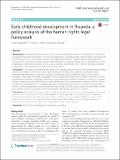| dc.contributor.author | Binagwaho, Agnes | en_US |
| dc.contributor.author | Scott, Kirstin W. | en_US |
| dc.contributor.author | Harward, Sardis H. | en_US |
| dc.date.accessioned | 2016-02-01T15:46:06Z | |
| dc.date.issued | 2016 | en_US |
| dc.identifier.citation | Binagwaho, Agnes, Kirstin W. Scott, and Sardis H. Harward. 2016. “Early childhood development in Rwanda: a policy analysis of the human rights legal framework.” BMC International Health and Human Rights 16 (1): 1. doi:10.1186/s12914-016-0076-0. http://dx.doi.org/10.1186/s12914-016-0076-0. | en |
| dc.identifier.issn | 1472-698X | en |
| dc.identifier.uri | http://nrs.harvard.edu/urn-3:HUL.InstRepos:24983991 | |
| dc.description.abstract | Background: Early childhood development (ECD) is a critical period that continues to impact human health and productivity throughout the lifetime. Failing to provide policies and programs that support optimal developmental attainment when such services are financially and logistically feasible can result in negative population health, education and economic consequences that might otherwise be avoided. Rwanda, with its commitment to rights-based policy and program planning, serves as a case study for examination of the national, regional, and global human rights legal frameworks that inform ECD service delivery. Discussion In this essay, we summarize key causes and consequences of the loss of early developmental potential and how this relates to the human rights legal framework in Rwanda. We contend that sub-optimal early developmental attainment constitutes a violation of individuals’ rights to health, education, and economic prosperity. These rights are widely recognized in global, regional and national human rights instruments, and are guaranteed by Rwanda’s constitution. Recent policy implementation by several Rwandan ministries has increased access to health and social services that promote achievement of full developmental potential. These ECD-centric activities are characterized by an integrated approach to strengthening the services provided by several public sectors. Combining population level activities with those at the local level, led by local community health workers and women’s councils, can bolster community education and ensure uptake of ECD services. Conclusions: Realization of the human rights to health, education, and economic prosperity requires and benefits from attention to the period of ECD, as early childhood has the potential to be an opportunity for expedient intervention or the first case of human rights neglect in a lifetime of rights violations. Efforts to improve ECD services and outcomes at the population level require multisector collaboration at the highest echelons of government, as well as local education and participation at the community level. | en |
| dc.language.iso | en_US | en |
| dc.publisher | BioMed Central | en |
| dc.relation.isversionof | doi:10.1186/s12914-016-0076-0 | en |
| dc.relation.hasversion | http://www.ncbi.nlm.nih.gov/pmc/articles/PMC4709993/pdf/ | en |
| dash.license | LAA | en_US |
| dc.subject | Early childhood development | en |
| dc.subject | Rwanda | en |
| dc.subject | Human rights | en |
| dc.title | Early childhood development in Rwanda: a policy analysis of the human rights legal framework | en |
| dc.type | Journal Article | en_US |
| dc.description.version | Version of Record | en |
| dc.relation.journal | BMC International Health and Human Rights | en |
| dash.depositing.author | Binagwaho, Agnes | en_US |
| dc.date.available | 2016-02-01T15:46:06Z | |
| dc.identifier.doi | 10.1186/s12914-016-0076-0 | * |
| dash.identifier.orcid | 0000-0002-5415-6479 | en_US |
| dash.contributor.affiliated | Scott, Kirstin | |
| dash.contributor.affiliated | Binagwaho, Agnes | |
| dc.identifier.orcid | 0000-0002-5415-6479 | |


